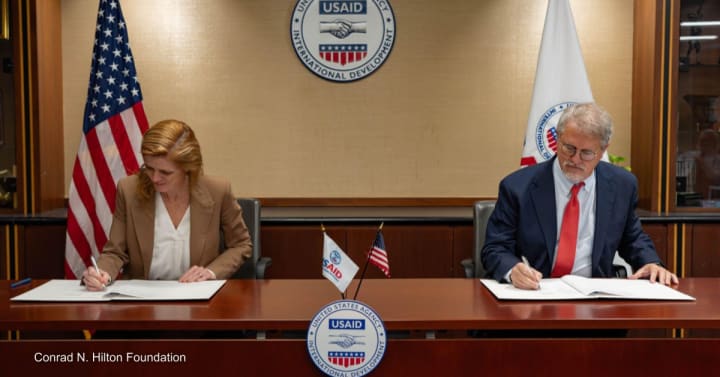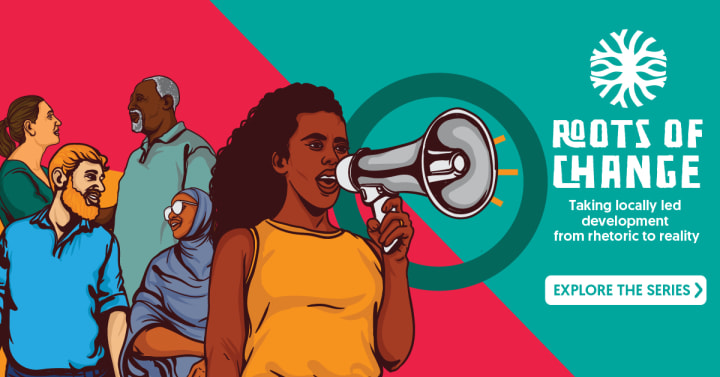
The concept of locally led development is hardly new. Yet, over the past several years, we have seen greater commitments, progress, and an emerging consensus that feels different, and consequential. Much of this has been driven by strong and visionary local civil society leadership alongside concerted efforts by more donors to shift more resources to those working closest to the challenges that we face and the solutions that we need to address them.
Starting with the Grand Bargain in 2016, the momentum has been one of steady progress. Commitments by bilateral and multilateral donors, including from the U.S. Agency for International Development under the leadership of Administrator Samantha Power and the Organization for Economic Co-operation and Development resulted in a clear and motivating set of broad principles and commitments to shifting who and how donors fund. The endorsement of a Donor Statement on Locally Led Development, which now includes 21 bilateral donors and 26 foundations in the United States and Europe, elevated the issue at the center of the development and humanitarian conversations.
The donor statement outlines three core areas for commitment and change: shifting and sharing more power with local partners; channeling more high-quality funding to local leaders; and publicly advocating for locally led development. It is a great articulation of what we should aspire to do better, and an important first step in how to do it well.
Shifting funding
At the Hilton Foundation, we are still early in our locally led development journey. In 2021, only 14.5% of our international funding went directly to locally led organizations. On the whole, U.S. philanthropy made 13% of its grants directly to local entities between 2016 and 2019.
We decided to make a whole-of-organization commitment to increase this proportion, based on our mission and values. This required us to reassess and change how we did business, such as broadening our grantee sourcing, streamlining our due diligence, and right-sizing our compliance as well as our conception of and appetite for risk. We set a target that at least 25% of our global grantmaking would go directly to local organizations by the end of 2023.
We found that many barriers to funding more locally could be easily surmounted. Last year, over 42% of our international funding went directly to local-led organizations — a nearly threefold increase in two years. Going more local also did not necessitate giving many smaller grants. In fact, we made several larger grants to local partners with excellent results, including in the humanitarian sector. Moving forward, we are committed to ensuring at least 25% to 30% of our global funding goes directly to local partners.
Grounds for optimism
As we moved more funding to local organizations, we surfaced some important questions, such as: What is the ideal portfolio size? How do we best identify and fund more local intermediaries?; and “can we reach a broader consensus on defining ‘local actors’ and having reliable data to track shifts in local funding?” We also saw the need for a robust research agenda to deepen the evidence base on how investing locally improves impact, sustainability, and local capacity.
Much of this evolution feels eminently doable within philanthropy, and we have taken some important strides in this regard in partnership with several foundations through the COF Leadership Circle on Locally Led Development.
There are also grounds for optimism with respect to bilateral donors. While USAID’s most recent localization progress report shows that only 9.6% of its funding went directly to local partners, the agency shows higher rates of localization in its funding for global health (over 20%) and Africa (22%). These are largely driven by the President’s Emergency Plan for AIDS Relief, or PEPFAR, which now channels a substantial proportion of its funding directly through local partners. I am encouraged by all the ways that more complementary bilateral-philanthropic partnerships and value chains have, and could increasingly, take root and bear fruit, perhaps more so than at any other time during my four decades in global development.
Becoming better donors
Locally led development is also about becoming better donors. This means re-thinking our roles, designing our strategies with early and regular input from those closest to the issue areas we fund, and listening to people with lived experience and expertise. It means understanding, valuing, and investing in local partner knowledge, capacity, and expertise at all levels as well as the infrastructure that supports them. It demands hearing from a diversity of perspectives, including those who are historically underrepresented, and honoring the adage of “nothing about us without us.”
Many of us in philanthropy are working in partnership with and funding key coalitions, including global south-led ones, such as through the Compliance Conundrum Collaboration, to identify and address key compliance barriers to more direct local funding and greater power sharing. Local civil society and philanthropic partners, such as Trust Africa, NEAR, and CIVICUS, to name a few, are already at the forefront of shaping conversations and scaling solutions.
Now is the time to meet the moment, to usher in a sea change era of greater locally led development with concrete goals, clear timelines, and real accountability for meaningful and long-lasting changes.
July 24, 2024: This article has been updated to attribute the correct percentages to USAID.
Dig into Roots of Change, a series examining the push toward locally led development.
This piece is sponsored by Conrad N. Hilton Foundation as part of our Roots of Change series. Click here to learn more.





